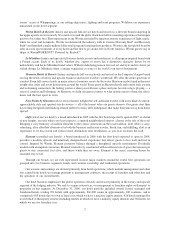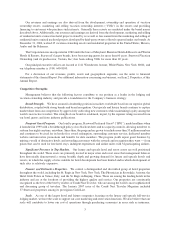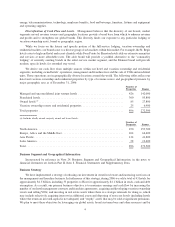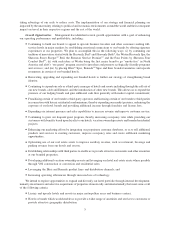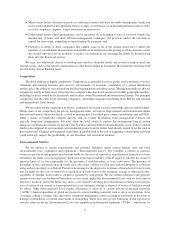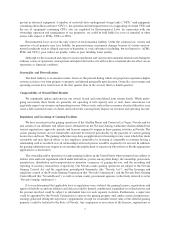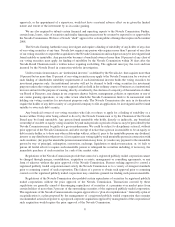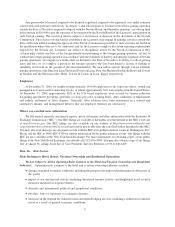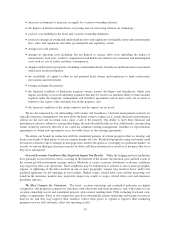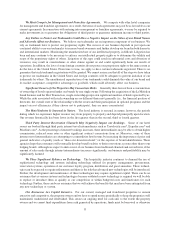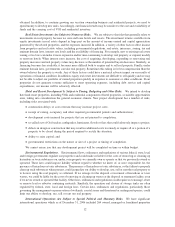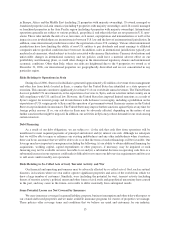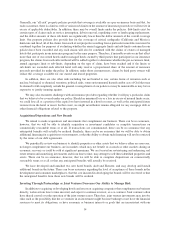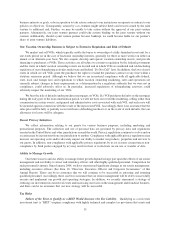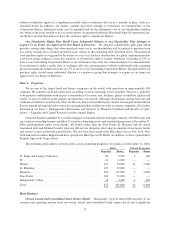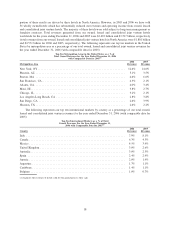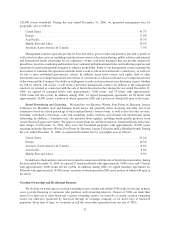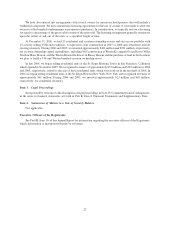Starwood 2006 Annual Report Download - page 19
Download and view the complete annual report
Please find page 19 of the 2006 Starwood annual report below. You can navigate through the pages in the report by either clicking on the pages listed below, or by using the keyword search tool below to find specific information within the annual report.obtained. In addition, to continue growing our vacation ownership business and residential projects, we need to
spend money to develop new units. Accordingly, our financial results may be sensitive to the cost and availability of
funds and the carrying cost of VOI and residential inventory.
Real Estate Investments Are Subject to Numerous Risks. We are subject to the risks that generally relate to
investments in real property because we own and lease hotels and resorts. The investment returns available from
equity investments in real estate depend in large part on the amount of income earned and capital appreciation
generated by the related properties, and the expenses incurred. In addition, a variety of other factors affect income
from properties and real estate values, including governmental regulations, real estate, insurance, zoning, tax and
eminent domain laws, interest rate levels and the availability of financing. For example, new or existing real estate
zoning or tax laws can make it more expensive and/or time-consuming to develop real property or expand, modify
or renovate hotels. When interest rates increase, the cost of acquiring, developing, expanding or renovating real
property increases and real property values may decrease as the number of potential buyers decreases. Similarly, as
financing becomes less available, it becomes more difficult both to acquire and to sell real property. Finally, under
eminent domain laws, governments can take real property. Sometimes this taking is for less compensation than the
owner believes the property is worth. Any of these factors could have a material adverse impact on our results of
operations or financial condition. In addition, equity real estate investments are difficult to sell quickly and we may
not be able to adjust our portfolio of owned properties quickly in response to economic or other conditions. If our
properties do not generate revenue sufficient to meet operating expenses, including debt service and capital
expenditures, our income will be adversely affected.
Hotel and Resort Development Is Subject to Timing, Budgeting and Other Risks. We intend to develop
hotel and resort properties, including VOIs and residential components of hotel properties, as suitable opportunities
arise, taking into consideration the general economic climate. New project development has a number of risks,
including risks associated with:
kconstruction delays or cost overruns that may increase project costs;
kreceipt of zoning, occupancy and other required governmental permits and authorizations;
kdevelopment costs incurred for projects that are not pursued to completion;
kso-called acts of God such as earthquakes, hurricanes, floods or fires that could adversely impact a project;
kdefects in design or construction that may result in additional costs to remedy or require all or a portion of a
property to be closed during the period required to rectify the situation;
kability to raise capital; and
kgovernmental restrictions on the nature or size of a project or timing of completion.
We cannot assure you that any development project will be completed on time or within budget.
Environmental Regulations. Environmental laws, ordinances and regulations of various federal, state, local
and foreign governments regulate our properties and could make us liable for the costs of removing or cleaning up
hazardous or toxic substances on, under, or in property we currently own or operate or that we previously owned or
operated. These laws could impose liability without regard to whether we knew of, or were responsible for, the
presence of hazardous or toxic substances. The presence of hazardous or toxic substances, or the failure to properly
clean up such substances when present, could jeopardize our ability to develop, use, sell or rent the real property or
to borrow using the real property as collateral. If we arrange for the disposal or treatment of hazardous or toxic
wastes, we could be liable for the costs of removing or cleaning up wastes at the disposal or treatment facility, even
if we never owned or operated that facility. Other laws, ordinances and regulations could require us to manage, abate
or remove lead or asbestos containing materials. Similarly, the operation and closure of storage tanks are often
regulated by federal, state, local and foreign laws. Certain laws, ordinances and regulations, particularly those
governing the management or preservation of wetlands, coastal zones and threatened or endangered species, could
limit our ability to develop, use, sell or rent our real property.
International Operations Are Subject to Special Political and Monetary Risks. We have significant
international operations which as of December 31, 2006 included 264 owned, managed or franchised properties
12


